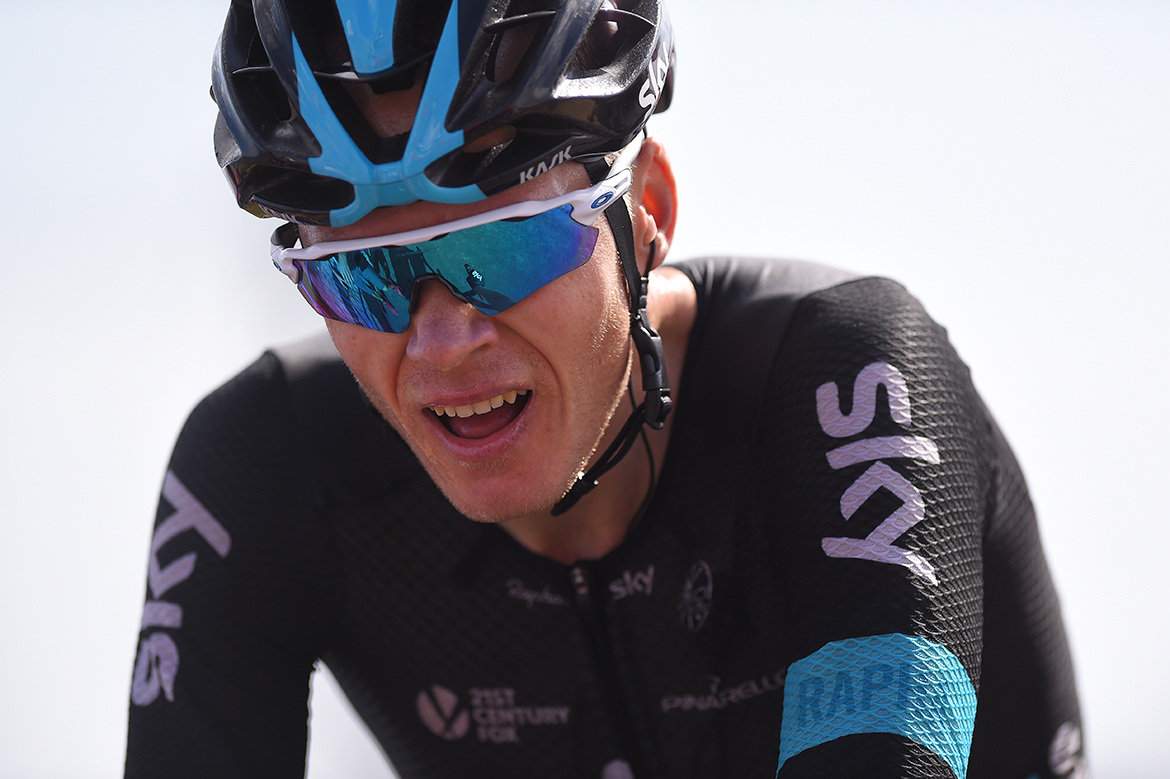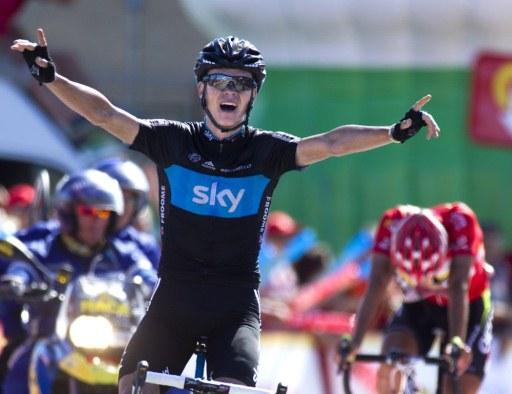Vuelta a Espana: Froome hoping to find best form in third week
Team Sky rider takes hope from Nibali's Giro d'Italia comeback

Chris Froome has described winning the Vuelta a Espana as his "next biggest priority" to the Tour de France, even if, as he said, it has been even less straightforward than usual for him to prepare for the Spanish Grand Tour this season.
Speaking in a rest day press conference, less than 24 hours after Froome turned in an immensely tenacious performance on the Lagos of Covadonga that sees him now lying third overall; the Team Sky leader outlined the reasons why he is so keen to triumph in Spain.
"I'd love to win the Vuelta, it's a beautiful race, it's a great part of the racing calendar, and after winning the Tour it's my next biggest priority," Froome told journalists in what is arguably his strongest declaration of intent about the Spanish Grand Tour to date.
"It's always been a little bit of an afterthought [compared to the Tour], but it's the race that I first showed my potential as a GC rider, and it would mean a lot to me if I could win it one day."
Froome's breakthrough second place overall at the 2011 Vuelta was partly carved out in Peña Cabarga, where, in a spectacular head-to-head duel with the now retired overall winner Juan Jose Cobo, the Briton managed to inch ahead for a narrow but clear stage victory over the Spaniard. The Vuelta a Espana returns to the same climb on Wednesday, and Froome is keen to show what he can do there again.
Asked if he could even win the Vuelta outright on the same short, but agonisingly steep, 4.5-kilometre climb, Froome said: "I don't think so. I wouldn't take enough on [Nairo] Quintana there, but obviously it has special memories for me, it is a big stage for us." Peña Cabarga is also where Vasil Kiryienka took Sky's only stage win in the 2013 Vuelta, which Froome didn't race.

The 2011 Vuelta a Espana
Get The Leadout Newsletter
The latest race content, interviews, features, reviews and expert buying guides, direct to your inbox!
Going back to 2011, Froome recollected, "Cobo was extremely strong in that Vuelta, it was only in the last few stages that I had the real opportunity to race head to head with him. Up until that point, I was doing a domestique's job. He won by 13 seconds I think, but he still won, and he was particularly impressive on the Angliru.
"I've got some pretty cool memories of that climb [Peña Cabarga]; it's one of my favourite victories in my career, my first as a professional. It's definitely not on the same level as the Aubisque," tackled by the 2016 Vuelta three days later, "and it's not as selective as that stage, but at the same time it's a tricky climb that does get progressively steeper, as you get to the top.
"It's a day you don't want to be caught out and have bad legs. But if yesterday [stage 10] it suited me to ride the last climb in certain style, that's not necessarily the case for other climbs."
Asked if he suffered as much in the Tour de France as in the Vuelta, Froome argued, "of course I suffered like this there." Explaining his point, he said, "I feel the difficult part of the Vuelta is that it's coming after the Tour and obviously all my focus goes into the Tour, and the Vuelta is on the back of that."
Froome added that this season, with a journey to Rio coming between the finale in Paris of the Tour and the Vuelta's start in Ourense four weeks later - something Quintana did not do - had made the adjustment back to racing at the Vuelta even harder. "We don't do altitude camps, especially with the Olympics in the middle there wasn't any time to reset and start rebuilding towards the Vuelta. That's why I feel as if I'm building into the race and hopefully I will get back to my best for the last week."
Setting his own pace
Froome's ascent to the Lagos de Covadonga, going at his own pace even if he slid back out of the GC group before returning to the fray in dramatic style, was once again the subject of several questions.
"There were a few factors going through my mind yesterday [Monday]. Fresh in my mind was two days earlier [stage eight to Alto de La Camperona summit finish, where Froome lost time to Quintana and Albert Contador Tinkoff -ed] when I got a bit carried away, gone for it on the earlier slopes and paid the price for it in the last kilometre.
"Then, also looking back at 2012 and 2014 when I did Lagos de Covadonga before and suffered quite a bit towards the top. So I thought, this time around, knowing it's a long climb knowing and where I'm at with my form in that I'm not at my Tour shape. I'm trying to build into this race, trying to get best out of myself, it certainly didn't suit me to start the climb hard at the bottom."
He explained that his principal point of reference for the pace he should take is not - as is often speculated - his power metre, but in fact his sensations. "Other than crashing, it's the worst feeling in the world if you start a climb too fast, and you're in the red and like I did a few days ago, you've blown. I've learned my lesson there.
"It is easy to get lured into the red early on, so basically yesterday I took a step back and gauged it a little better and it definitely served me well."
As for what kind of gap Quintana might need to win the Vuelta and what kind of gap Froome might need to beat him if it did comes down to the stage 19 time trial, Froome argued, "I've no idea. Quintana has been strong in time trials earlier this year, so has Valverde. I'm going to have the goal of getting to the time trial in the best place possible and give it everything I got."
Asked how he rated Quintana as a climber in the Vuelta, compared to the Tour, Froome said with a wry smile, "I didn't see him much yesterday; he was too far up the road. But I've got a lot of respect for him as a rider and as a rival, he's definitely lifted himself after the Tour. He had a lot of downtime; he didn't do the Olympics, he went back to Colombia trained up at altitude, he's come here ready.
What sets Quintana apart from the other rivals? "He's a lot less about the show, he doesn't do great big attacks almost for the TV, I don't think he caves to pressure from the public. He focuses on his own race, if he feels good, then he'll push on, if not then he'll sit on the wheels like he did in the Tour."
However, despite the tendency amongst the media to see the Vuelta from hereon as a shootout between the Colombian and the Briton, Froome denied that was the case. Nor did he feel that victory or defeat in the Vuelta would be automatically at one point or another in the race.
"It's not a head-to-head between myself and Quintana, there's a handful of guys, Valverde, Contador lost a little bit of time, and he's been up there for the last few days, we can expect a strong final week from him. [Esteban] Chaves (Orica-BikeExchange) has been quietly doing his thing."
Pointing back to recent cycling history, Froome said, "I think we all have to remember and look back the Giro and remember how quickly things can change, even with a four-minute deficit, [Vincenzo] Nibali (Astana) managed to win it. So that obviously gives me a lot of hope, and serves as a reminder that things, especially in Grand Tours, can change quite quickly."
For now, though, Froome is fulfilling his mission of riding in the race, and his objective - winning the Vuelta - is at least as clear-cut and attainable as it was ten days ago in Ourense, if not more so.
Alasdair Fotheringham has been reporting on cycling since 1991. He has covered every Tour de France since 1992 bar one, as well as numerous other bike races of all shapes and sizes, ranging from the Olympic Games in 2008 to the now sadly defunct Subida a Urkiola hill climb in Spain. As well as working for Cyclingnews, he has also written for The Independent, The Guardian, ProCycling, The Express and Reuters.
